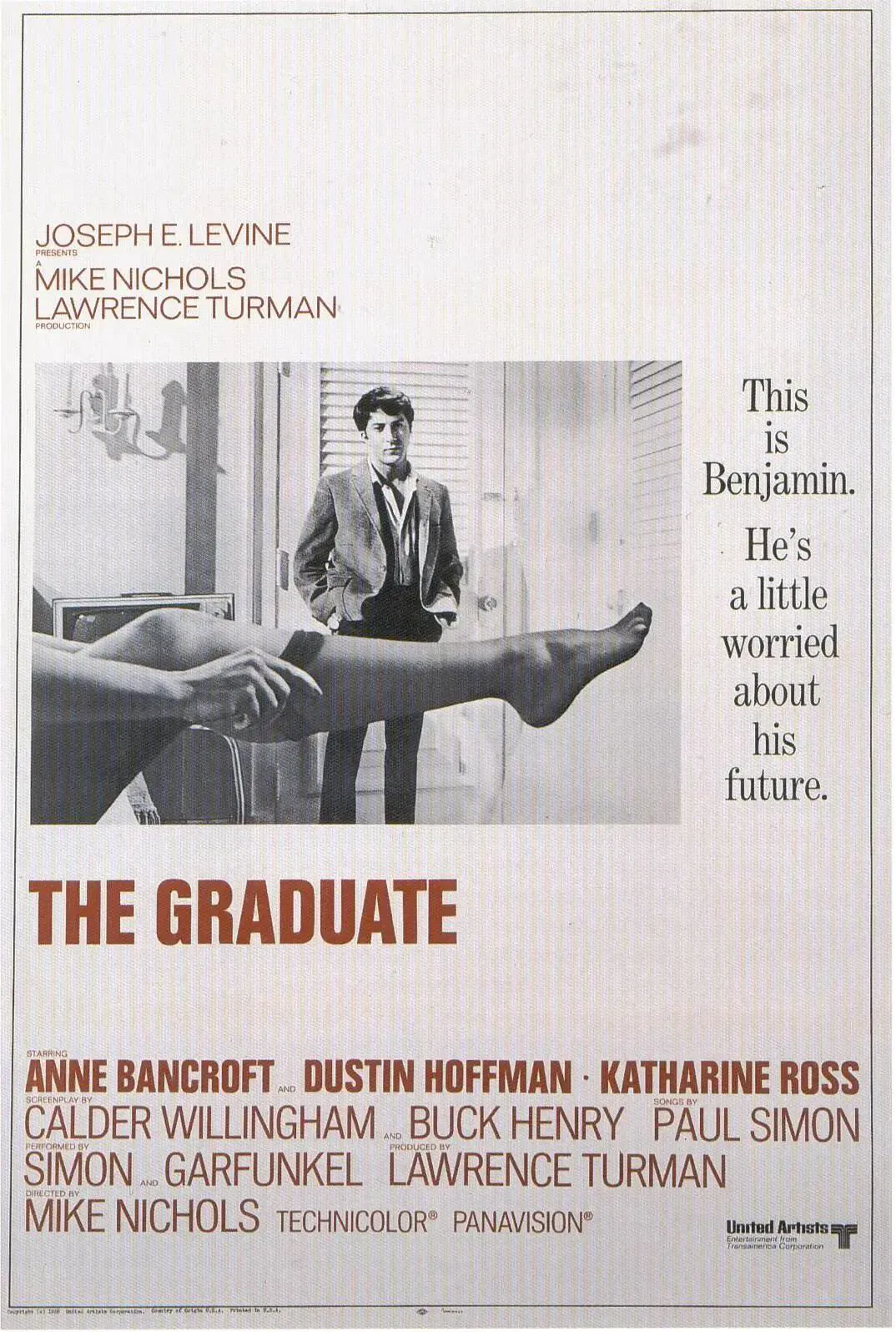The Graduate: A Timeless Tale of Youthful Disillusionment

“The Graduate,” released in 1967, remains a cinematic touchstone, capturing the essence of post-graduation angst among American youth in the turbulent 1960s. It’s a story of uncertainty, rebellion, and the search for meaning in a world that seems to offer only hollow promises.
One of the film’s most enduring aspects is its soundtrack, featuring iconic songs like “The Sound of Silence” and “Scarborough Fair.” These melodies evoke a sense of vast emptiness that resonates deeply.
“The Sound of Silence,” in particular, is often linked to the “Beat Generation,” a counter-cultural movement that challenged the conformity of the era. The 1960s saw rapid economic growth in the United States, leading to an age of affluence. However, this prosperity was accompanied by widespread social upheaval, including the rise of sexual liberation and anarchist ideologies. Middle-class youth, despite their material comforts, often felt spiritually adrift, lacking guidance and purpose. They channeled their discontent through rock music, the hippie movement, and other forms of rebellion, creating a powerful wave of change that crashed against the shores of traditional society.
I first watched this film several years ago, and it left me stunned, perhaps too much so to fully appreciate its nuances.
Revisiting it recently, I discovered layers of meaning I had previously missed. Here are a few of my observations:
Themes Explored in “The Graduate”
The Suffocating Weight of Uncertainty
The film opens with Benjamin Braddock, a recent college graduate, attending a party thrown by his parents. He’s surrounded by their friends and colleagues, all eager to celebrate his accomplishments and offer unsolicited advice about his future. It’s reminiscent of a family gathering where relatives discuss careers, finances, and relationships, creating an atmosphere of polite conversation that barely conceals underlying tensions.
Benjamin is lost.
None of the older generation can provide him with answers. The solution, as always, must come from within. However, his predicament is complicated when Mrs. Robinson, a bored and disillusioned housewife, sets her sights on him. Seeking excitement, she seduces Benjamin, turning him into a plaything.
In their first encounter, Mrs. Robinson almost succeeds, but her husband’s unexpected arrival forces Benjamin to retreat. Shortly after, following another party thrown by his parents to celebrate his (unwanted) graduate studies, Benjamin initiates an affair with Mrs. Robinson.
If the first party represented Benjamin’s initial confusion and desire to escape, the second party brings a sense of suffocation. Trapped in a diving suit, he is repeatedly pushed back into the pool by his parents, resembling a trained dolphin in an aquarium. He lacks freedom, and the feeling of struggling underwater is palpable.

Benjamin, at 21, is treated like a child, paraded in front of his parents’ friends. This lack of autonomy is stifling. He has no personal space and is unable to assert himself against the older generation. He’s conditioned to obey, making it difficult to resist Mrs. Robinson’s advances. He simply can’t say “no.”
While some may crave affection, Benjamin is smothered by his mother’s overbearing love.
Rebellion and Escape
Driven by inner turmoil, Benjamin initiates the affair with Mrs. Robinson.
Even in the initial stages of their encounter, Benjamin’s lack of control is evident. He tries to order a drink, but the waiter ignores him. Mrs. Robinson, with her commanding presence, effortlessly gets the waiter’s attention, highlighting Benjamin’s weakness.
Later, as they undress, Benjamin attempts to take charge, but his awkwardness reveals his inexperience. He asks Mrs. Robinson whether she prefers a wooden or steel hanger, demonstrating his ingrained habit of deferring to authority. When she hangs up her clothes, his gesture seems pointless. Then, as Mrs. Robinson removes her coat, Benjamin awkwardly places his hand on her breast, only to be completely ignored as she brushes lint off her clothing.
Frustrated, Benjamin retreats into the shadows, declaring that he can’t go through with it. He suggests seeing a movie instead. This isn’t a sudden moral awakening, but a reaction to the accumulated frustration of being constantly overlooked and belittled.
Benjamin’s actions are a form of rebellion, a way to strike back at the older generation’s infantilizing behavior. While the affair provides temporary physical relief, as seen in his relaxed state by the pool, it doesn’t address his underlying sense of emptiness.Conflict and Continued Uncertainty
Benjamin’s parents, concerned by his idleness, begin to arrange a relationship for him with Elaine, Mrs. Robinson’s daughter.
Mrs. Robinson is unhappy with this development. She wants to protect her daughter from the potential pain of discovering the affair. Furthermore, she is jealous of the idea of Benjamin sharing a genuine relationship with Elaine.
She forbids Benjamin from seeing her daughter, triggering his rebellious instincts. He sees himself as a pawn in the adults’ games and decides to defy them.
Perhaps fueled by this rebellion, Benjamin finds himself genuinely attracted to Elaine, and she reciprocates his feelings.
The affair is exposed, and the parents are horrified. Despite the scandal, Elaine is drawn to Benjamin. He follows her to college, rents an apartment nearby, and relentlessly pursues her. This could be seen as another act of rebellion, a way to punish Mrs. Robinson and assert his own desires. Beneath the surface, there may also be a genuine longing for a pure and meaningful relationship, a desire to reclaim the innocence he lost with Mrs. Robinson.
The landlord of Benjamin’s apartment is an interesting character.
Despite the perceived openness of American culture, the landlord is a model of propriety, reminiscent of traditional Chinese values. However, his foreignness makes him seem somewhat comical and insincere.
In the film’s climax, Benjamin disrupts Elaine’s wedding, rescuing her from a life she doesn’t want. They escape on a bus, sitting together in the back. “The Sound of Silence” plays again, and their initial joy gives way to uncertainty.
What will become of them? Will their relationship be tainted by the events that brought them together? The film ends without providing easy answers.
“The Graduate” comes full circle, returning to the initial state of confusion.
Despite its underlying sadness, the film remains light and engaging.
The setting in 1960s America provides a sense of distance and safety. The characters’ privileged lives, free from financial worries, highlight the spiritual emptiness that can accompany material comfort.
In times of peace, youth is often associated with confusion and love, sometimes leading to the term “useless youth.” In times of conflict, youth is linked to faith and passion, creating “zealous youth.” Young people are full of energy, hope, and potential. As “Sapiens: A Brief History of Humankind” suggests, the brains of young people are not yet fully developed, implying that they are still growing and evolving.
“The Graduate” reflects the confusion of American youth in the 1960s. What is the current situation for college graduates in China? Many say that a college degree is no longer valuable and that it is difficult to find a job. Data shows that the number of college graduates is beginning to exceed the number of non-graduates. College graduates are young people, but so are those without degrees. All young people experience confusion.
Time passes, and the confusion of youth has no easy answers. Only time can resolve these questions. Perhaps this is the meaning of “forty is not confused.” Move forward and look ahead. Growth is ultimately a personal journey, and everyone will spend their lives in the torrent of time. Finally, have you ever been confused in your youth?